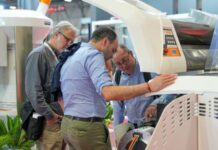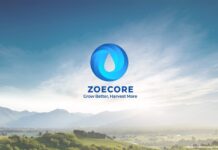GEA is rolling out the Add Better ecolabel to highlight GEA solutions – including industrial machines, processes and plants – that are significantly more resource efficient than their predecessors. The label provides customers with a detailed overview of the improvements made, including how the Add Better product can help them reduce their ecological impact and reduce operating costs. GEA’s Add Better product evaluation process – from data collection to calculation and documentation – follows the ISO 14021:2016 requirements for environmental labels and declarations. GEA’s approach has been validated by TÜV Rheinland, one of the world’s leading testing service providers.
“Every day, our purpose ‘Engineering for a better world’ drives us to develop solutions, that use less energy, water and raw materials and produce less waste. The Add Better label identifies the most significant advances we are making in this area,” says GEA Group CEO Stefan Klebert. “These product upgrades can significantly improve our customers’ resource and operational efficiency as well as help all of us achieve our sustainability targets.”
TÜV Rheinland validates GEA’s approach
The process underlying GEA’s Add Better label process meets the ISO requirements for self-declared environmental claims, including specific evaluation and verification methodologies. The first step in the process is the selection of the solution to be evaluated by an interdisciplinary team of GEA experts, including a detailed description of the technology and its application. GEA then defines the technical, geographical and temporal scope of the solution and its assessment. On this basis, relevant data about the technology and its predecessor is collected and verified. The process of data collection, calculation and detailed documentation of results was developed in collaboration with TÜV Rheinland. As a final step, GEA’s Global Executive Committee reviews the results to make sure the efficiency gains are significant enough to merit the Add Better label. The process is designed to ensure optimum transparency for GEA customers.
“Innovative solutions are crucial in achieving global climate targets, reliable and trustworthy ecolabels are increasingly relevant as a way to inform customers and provide guidance for companies in their procurement process,” emphasizes Susanne Jorre, TÜV Rheinland’s sustainability expert who is leading GEA’s project. “We were pleasantly surprised by GEA’s decision to seek additional, external validation even though it is not necessary for this type of ecolabel. However, from the onset of the process, it became very clear that for GEA sustainability is more than just talk.”
Add Better helps to reduce greenhouse gas emissions
Sustainability is one of GEA’s key levers for future growth. By designating 2023 the “Year of Innovation in Sustainability”, GEA is striving to not only advance its climate action agenda but also accelerate the transformation of the mechanical engineering industry.
“The most effective way to reduce overall emissions is to make machinery, equipment and components more efficient for our customers. With the Add Better approach, we are also promoting our internal product development,” adds Dr. Nadine Sterley, GEA’s Chief Sustainability Officer. “Therefore, our first three Add Better solutions are just the beginning. Other products that enable significant energy or water savings are already in the validation phase.”
Three GEA solutions carry the Add Better ecolabel; portfolio to be continuously expanded
The label will now be applied to eligible solutions across GEA’s vast product portfolio, starting with GEA’s AddCool Spray Dryer, Marine Separator and Dairy Robot. GEA will continuously expand its Add Better portfolio through the addition of new solutions. The pipeline for the next validation round is already filled with proposals ranging from solutions for the bakery and beverage to the dairy industry.
These are the first three Add Better solutions:
AddCool Spray Dryer – a milestone in energy savings
Spray drying is an established industrial method for the manufacture of high-quality, stable powders. In a milk powder processing plant, for example, the spray dryer is responsible for up to 70 percent of the overall heating requirements, which typically rely on energy generated from fossil fuels. GEA’s AddCool technology can reduce a plant’s primary energy consumption by up to 49 percent in comparison to its predecessor. This corresponds to the average electricity consumption of approximately 8,650 two-person households per year. This is achieved by integrating high-temperature heat pump technology into existing spray drying processes, thereby dramatically reducing the reliance on fossil fuels.
Marine Separator – water protection at sea
Separators are used for the clarification of liquids or the separation of liquid mixtures of different densities. For the marine industry, centrifugal separators are deployed to purify fuel and lube oil as well as to treat bilge water on board ships. GEA’s direct-drive Marine Separator consumes nine percent less energy than its predecessor. The Marine Separator has also extended the maintenance interval from 8,000 hours to 16,000 hours and reduced the workload for regular cleaning by 95 percent.
Dairy Robot – supporting sustainable farming
By combining process automation with digitalization, GEA is helping dairy farmers make their operations more sustainable, flexible and easier to manage while improving animal welfare. The Dairy Robot for automated milking requires up to 19 percent less energy compared to the predecessor model. Combined with the energy savings, these enhancements result in significantly more resource-efficient and economical milking to support next-generation dairy farming. Prior to receiving the Add Better label, the Dairy Robot’s efficiency gains were also confirmed through independent testing by the German Agricultural Society (Deutsche Landwirtschafts-Gesellschaft – DLG).






